Module 10 Unit 2 Sam has lots of chocolate 课件(共65张PPT)
文档属性
| 名称 | Module 10 Unit 2 Sam has lots of chocolate 课件(共65张PPT) |
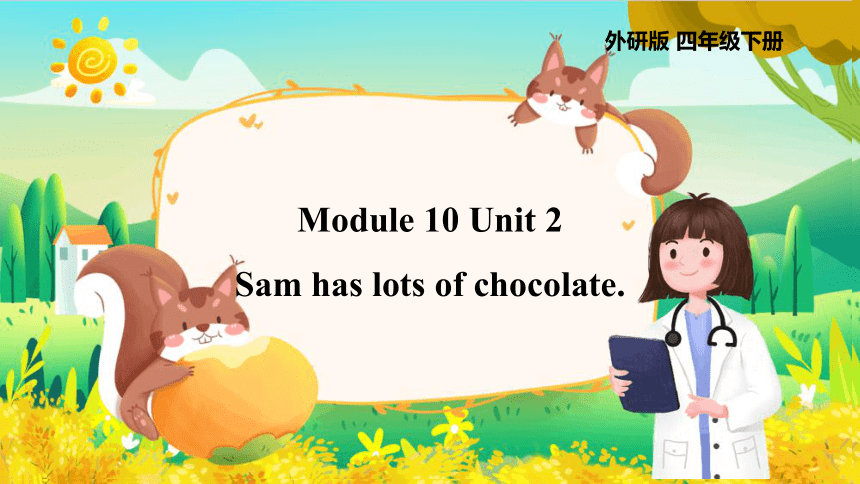
|
|
| 格式 | pptx | ||
| 文件大小 | 8.3MB | ||
| 资源类型 | 试卷 | ||
| 版本资源 | 外研版(三年级起点) | ||
| 科目 | 英语 | ||
| 更新时间 | 2024-05-17 16:27:27 | ||
图片预览

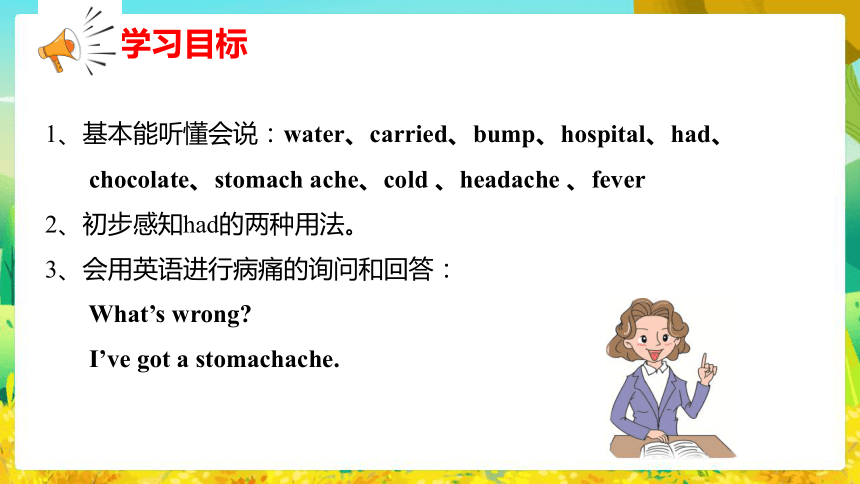
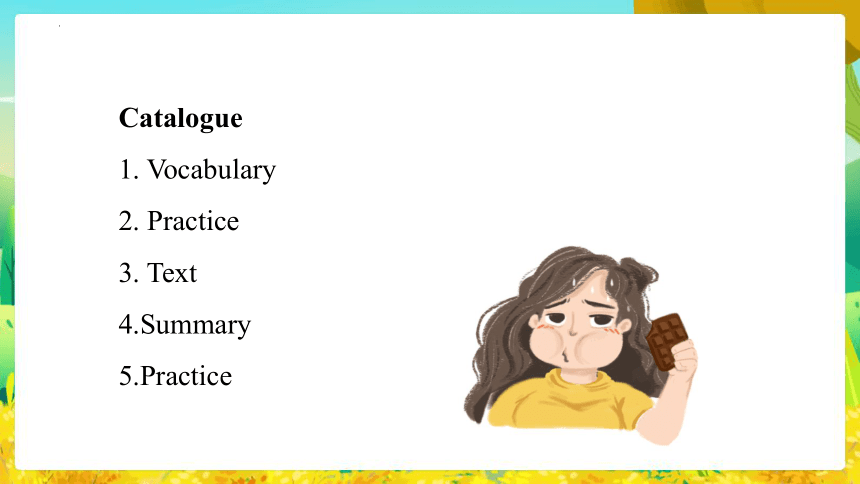
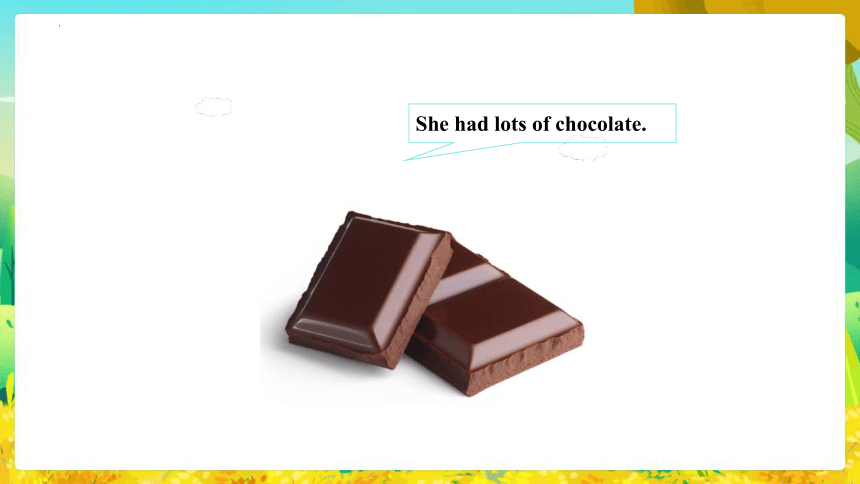
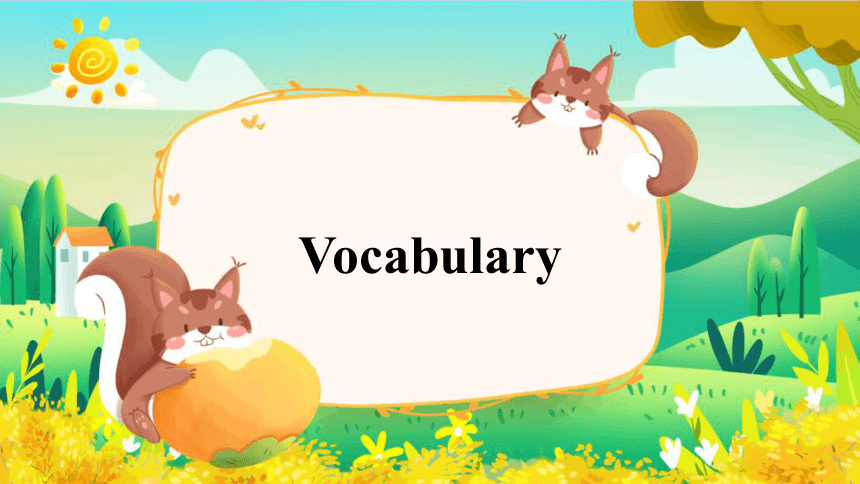
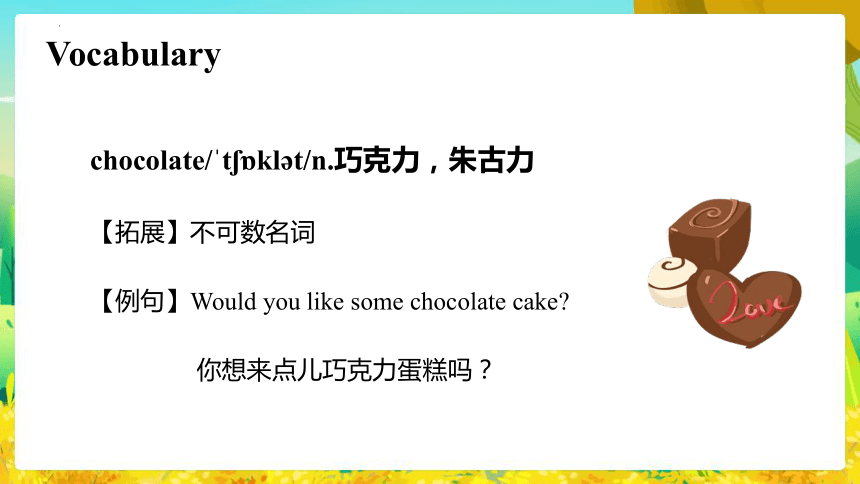
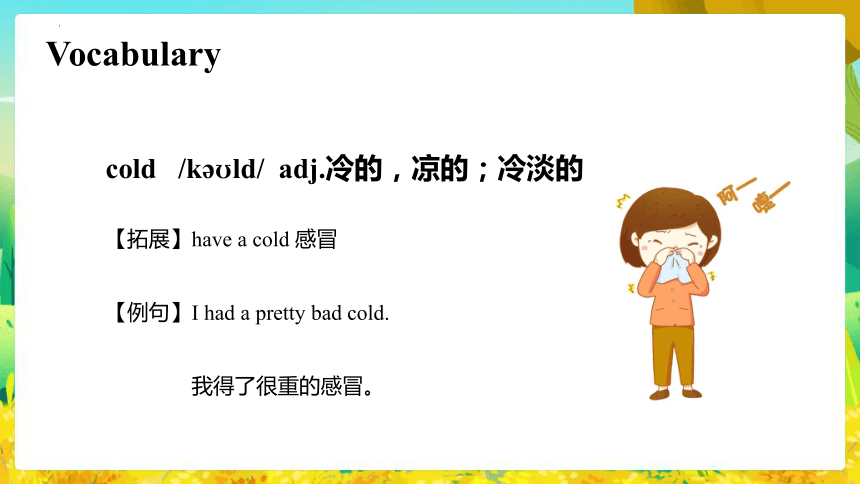
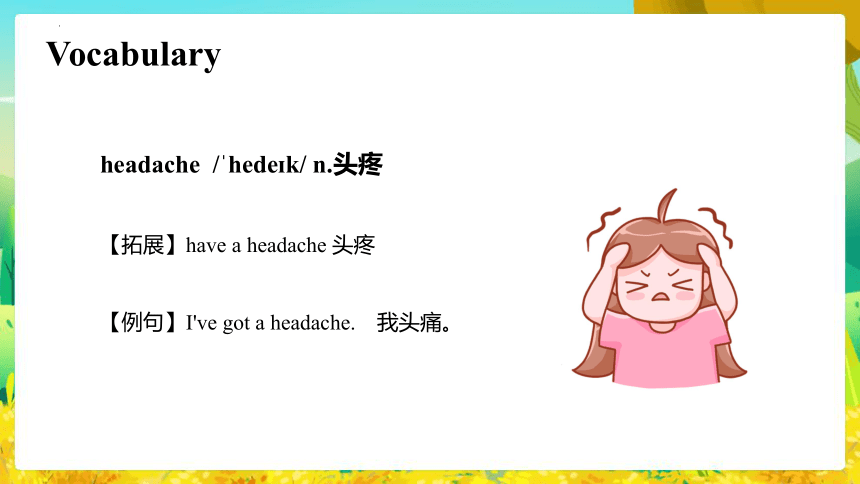
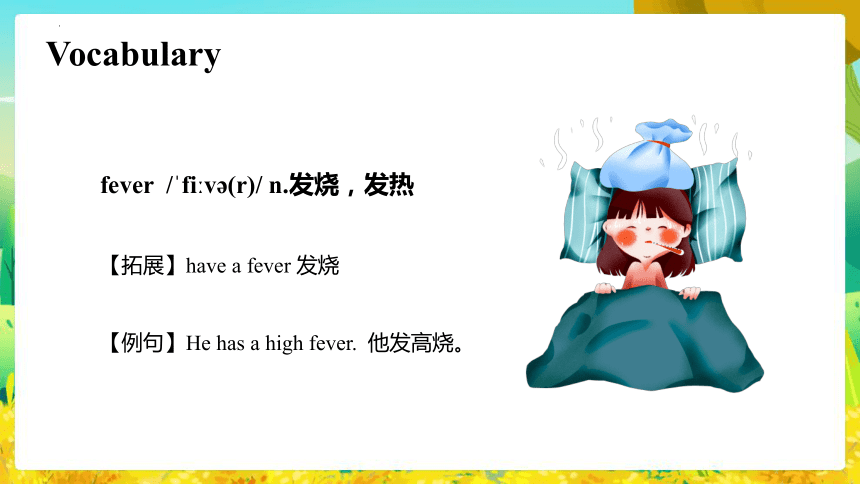
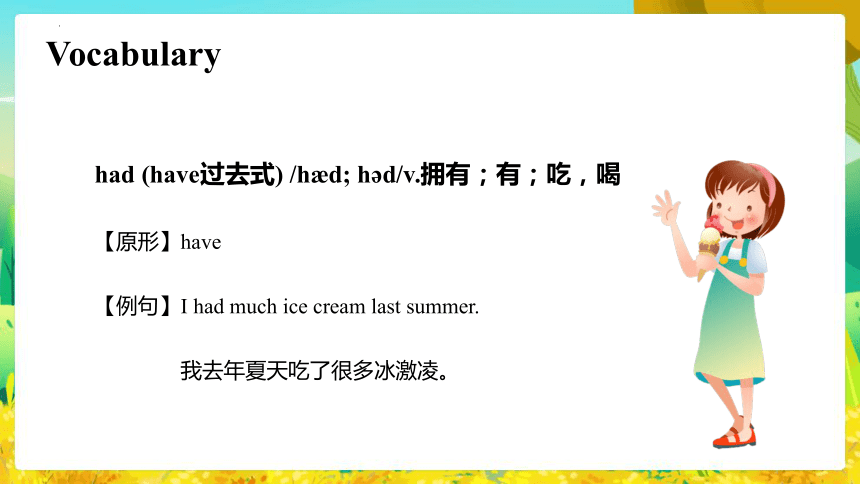
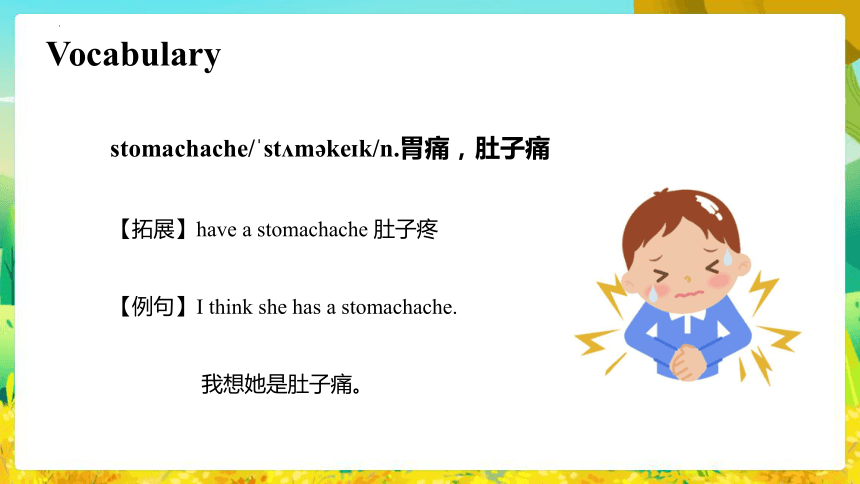
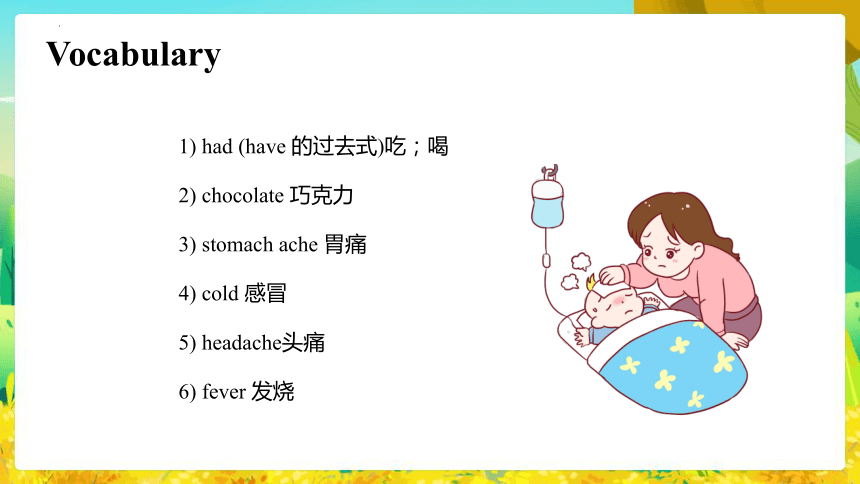
文档简介
(共65张PPT)
外研版 四年级下册
Module 10 Unit 2
Sam has lots of chocolate.
学习目标
1、基本能听懂会说:water、carried、bump、hospital、had、
chocolate、stomach ache、cold 、headache 、fever
2、初步感知had的两种用法。
3、会用英语进行病痛的询问和回答:
What’s wrong
I’ve got a stomachache.
Catalogue
1. Vocabulary
2. Practice
3. Text
4.Summary
5.Practice
She had lots of chocolate.
Vocabulary
Vocabulary
chocolate/ t kl t/n.巧克力,朱古力
【拓展】不可数名词
【例句】Would you like some chocolate cake
你想来点儿巧克力蛋糕吗?
Vocabulary
cold /k ld/ adj.冷的,凉的;冷淡的【拓展】have a cold 感冒
【例句】I had a pretty bad cold.
我得了很重的感冒。
Vocabulary
headache / hede k/ n.头疼
【拓展】have a headache 头疼
【例句】I've got a headache. 我头痛。
Vocabulary
fever / fi v (r)/ n.发烧,发热
【拓展】have a fever 发烧
【例句】He has a high fever. 他发高烧。
Vocabulary
had (have过去式) /h d; h d/v.拥有;有;吃,喝
【原形】have
【例句】I had much ice cream last summer.
我去年夏天吃了很多冰激凌。
Vocabulary
stomachache/ st m ke k/n.胃痛,肚子痛
【拓展】have a stomachache 肚子疼
【例句】I think she has a stomachache.
我想她是肚子痛。
1) had (have 的过去式)吃;喝
2) chocolate 巧克力
3) stomach ache 胃痛
4) cold 感冒
5) headache头痛
6) fever 发烧
Vocabulary
Vocabulary
1) have a picnic 野餐
2) play games 做游戏
3) have lots of chocolates 吃了很多巧克力
4) get a stomach ache 胃疼
5) have a cold 感冒
6) get a fever 发烧
Vocabulary
7) fell offa chair 从椅子上摔下来
8) bumped his head 撞了头
9) carry him to the car 把他搬到汽车上
10) go to the doctor 去看医生
11) buy Tom some chocolate 给 Tom买一些巧克力
12) eat it all 全吃完
根据汉语提示,选出正确的单词。
( )1.巧克力 A. watermelon B. ice cream C. chocolate
( )2.感冒 A. cold B. hot C. windy
( )3.发烧 A. ever B. very C. fever
( )4.头痛 A. ache B. stomach ache C. headache
( )5.撞伤 A. fall B. bump C. town
短语配对。
( )1. have (got) a stomach ache A.感冒
( )2. have (got) a headache B.胃痛
( )3. have (got) a fever C.头痛
( )4. have (got) a cold D.发烧
Text
We had a picnic yesterday.
We played games all the day.
And I ate a very big cake.
So I’ve got a stomach ache.
Listen and chant.
去野餐
玩游戏
肚子疼
Listen and say.
Listen and say.
Sam had lots of chocolate yesterday, so today he’s got a stomach ache.
Daming had two watermelons yesterday, so today he’s got a stomach ache.
Amy had a cold yesterday, she’s got a headache.
Lingling had a headache yesterday, and today she’s got a fever.
Listen and say.
吃了很多巧克力
肚子疼
吃两个西瓜
肚子疼
感冒了
头疼
头疼
发烧
fell off the chair
bumped his head
carried him to the car
went to the doctor
bought Tom some chocolate
ate it all
Point and say.
Tom fell off the chair.
Listen and say. Then chant.
Little Tommy had a horrible cold.
His nose was red and he felt cold, cold, cold.
Little Lingling had a fever, hot!
Her face was wet and she felt hot , hot, hot.
And little Ben had aheadache.
He held his head and it ached, ached, ached.
Listen and say. Then chant.
Guess and say.
你又渴又饿,还感冒了。
她又渴又饿,还感冒了。
Draw and say.
上星期天我起床了,我又饿又渴。妈妈做了面包。但是我的猫吃了我的面包。
chocolate biscuits
watermelons
Sam had lots of chocolate biscuits yesterday.
had (have的过去) 吃;患(病)
Daming had two watermelons yesterday.
cold
headache
fever
stomachache
Cold, cold, she had a cold.
Fever, fever, he had a fever.
Headache, headache,
She’s got a headache.
Stomachache, stomachache, he’s got a stomachache.
She has got a cold.
I have got a headache.
He has got a fever.
He has got a stomachache.
我有,我有: I have got = I`ve got
你有,你有: You have got = You`ve got
他有,他有: He has got = He`s got
她有,她有: She has got= She`s got
我们有: We have got = We`ve got
你们有: You have got = You`ve got
他们有: They have got = They`ve got
缩写形式
Today he’s got a stomachache .
Today he’s got a stomachache.
Today she’s got a headache.
Today she’s got a fever.
Yesterday Today
Sam
Daming
Daming had two watermelons yesterday.
Today he has got a stomachache.
Today he has got a stomachache.
Sam had chocolate biscuits yesterday.
Yesterday Today
Amy
Lingling
Amy had a cold yesterday.
Lingling had a headache yesterday.
Today she has got a fever.
Today she has got a headache.
Grammar
Sam had lots of chocolate yesterday,so today he's got a stomach ache.
昨天萨姆吃了许多巧克力,所以今天他胃痛。
【解读】So 是在并列句中表示因果关系的并列连词。
【举一反三】 She had a headache today,so she didn't come.
她头痛,所以没有来。
Grammar
Amy had a cold yesterday,and today she's got a headache.
埃米昨天感冒了,今天她头痛。
【解读】连词and在并列句中表示顺承或递进关系,强调前后的内容与形式一致。
【举一反三】 He was very thirsty,and he had a fever.他非常渴,他发烧了。
Grammar
表达某人过去吃了某物的句型..had...
Sam had lots of chocolate yesterday, so todayhe's got a stomach ache.
萨姆昨天吃了许多巧克力,所以今天他胃痛。
句型结构:某人+had+食物(two watermelons, three hamburgers.)(+表示过去的时间)
表达某人过去吃了某物的其他句型
某人+ate+食物(+表示过去的时间)
Grammar
Grammar
表达病痛
Sam had lots of chocolate yesterday, so today he'sgot a stomach ache.
萨姆昨天吃了许多巧克力,所以今天他胃痛。
句型结构:某人+have/has got a/an+疾病名词(短语)
常见的疾病名词(短语)有: cold (感冒) , fever (发烧),headache (头疼) ,
stomach ache (胃痛) , toothache (牙疼) 等。
辨析 have got 与 have
【详解】 have got和have意思一样,都有“有”的意思。
have got是英式英语的用法,一般用于口语,非正式语言。通常美国人用have。
以下三种情况have=have got。
Grammar
以下三种情况have=have got。
1.表示"有” 。I have a pen.-I have got a pen.
2表示“得病” 。I have a headache.-I have got a headache.
3.have to = have got to “不得不;必须”。
Grammar
【注意】在下列情形下,只能用have/has,不能用have/has got。
在助动词或情态动词之后,不能用have/has got。
他没有电脑。
He doesn't have got a computer.(×)
He hasn't got a computer.( √)
He doesn't have a computer.( √)
Grammar
Grammar
2.当 have与动词转化而来的名词构成短语时,不能用 have/has got.
have a look, have a break, have a drink
3. 在一些固定搭配中,不能用has got。
have a good time, have breakfast, have lessons
How many “had” can you find in this article
两句话中的had 的意思是吃和ate 的意思相同
后两句话中had 是习惯用语,意思是患病 .
Grammar
have 用法
1) have+表示一日三餐的名词,意为“用餐”
比如: have breakfast/lunch/ supper吃早餐/午餐/晚餐
2) have+表示食品、饮料等名词,意为“吃、喝”。
比如: have (some) bread吃面包have eggs for breakfast早餐吃鸡蛋
3) have+表示动作的名词
比如: have a rest休息一下have a drink喝一点
Grammar
have 用法
4) have+表示某种活动的名词,意味“进行、举行”。
比如: have a class上课have a birthday party举行生日聚会
5) have+其他疾病类的名词,表示患病。
比如: have a cold/ fever/ headache/stomachache
Grammar
Practice
看图写单词
写出下列动词的过去式
从下面每组四个单词中选出一个不同类的单词,将其序号写在题前括号中
( ) 1. A. chocolate B. watermelon C. biscuit D. headache
( ) 2. A. stomachache B. toothache C. horrible D. headache
( ) 3. A. nose B. hot C. cold D. wet
( ) 4. A. hungry B. watermelon C. thirsty D. dirty
( ) 5. A. went B. bought C. yesterday D. fell
选择,将序号写在前面括号中
( ) 1. I am __________. So I want to drink some water.
A. hungry B. cold C. thirsty
( )2. She had lots of food, so she has got a__________.
A. fever B. headache C. stomachache
( )3, Amy carried the bag __________the bike.
A. in B. on C. at
( )4. Her nose was red and she __________cold.
A. feel B. felt C. got
根据汉语提示完成句子
1. ___________(怎么了)your leg
2. Xiaoming and Amy were ___________ (又饿又渴).
3. Darning and Sam ___________ (买了一个西瓜)yesterday.
4. Amy ___________bike(从……跌落).
5. Darning ___________ (吃了两个西瓜) yesterday.
6. You ___________ (患了感冒) last night.
7. ___________ (她的书) are on the desk.
8 .This is ___________ (他的书包).
用所给词的正确形式填空完成短文
Last holiday we ___1___ (play) games and we ___2___ (go) swimming, but we ___3___ (do not) watch TV. My mother ___4___ (cook) our favourite food and we ___5___ (help) her. We often___6___ (go) for a walk in the park. One day, it ___7___ (is) a nice day, we ___8___ (buy) some bread. I___9___ (like)bread. I___10___ (love) fruits, too. So on that day I___11___ (buy) some fruits and ___12___ (eat) them.
读下面的句子,然后给图片标上序号
1. Then Lingling fell off the swings.
2. So they bought some sandwiches and some water.
3. Then they played in the park.
4. They were hungry and thirsty.
5. Then she had a headache!
6. Yesterday Lingling and Amy went to the park.
7. She bumped her head.
8. They carried them to a table. They had them for lunch.
阅读短文并判断对错
My name is Lin Tao. I’m Chinese. I’m 10. I’m a pupil. My English teacher is Ms Smart. She’s young. She’s in a red skirt. I have a good friend in my class. His name is Maomao. He’s Chinese, too. He is taller than I.
( ) 1. Lin Tao is a pupil.
( )2. Ms Smart is Lin Tao’s Chinese teacher.
( )3. Maomao and Lin Tao are good friends.
( )4. Lin Tao is taller than Maomao.
将下列句子重新排列,使其成为一段完整的短文。
A. And then they went home.
B. Jim fell off his bike yesterday.
C. They went to the doctor.
D. Mum carried him to the car.
E. He bumped his head.
正确的顺序为:_______________________________________
阅读对话,选择正确的答案。
Alice: Hello, Lingling!
Lingling: Hi, Alice!
Alice: What did you do last weekend
Lingling: I helped my mother. And then I played computer games. What did you do
Alice: I bought a book for my friend.
( )1. What did Lingling do last weekend
A. She helped her mother. B. She played the piano.
C. She watched TV.
阅读对话,选择正确的答案。
Alice: Hello, Lingling!
Lingling: Hi, Alice!
Alice: What did you do last weekend
Lingling: I helped my mother. And then I played computer games. What did you do
Alice: I bought a book for my friend.
( )2. What did Alice do
A. She played computer games. B. She cleaned her room.
C. She bought a book for her friend.
阅读对话,选择正确的答案。
Alice: Hello, Lingling!
Lingling: Hi, Alice!
Alice: What did you do last weekend
Lingling: I helped my mother. And then I played computer games. What did you do
Alice: I bought a book for my friend.
( )3. Did Alice buy a book
A. Yes, she did. B. No, she didn’t.
C. Yes, she didn’t.
阅读对话,选择正确的答案。
Alice: Hello, Lingling!
Lingling: Hi, Alice!
Alice: What did you do last weekend
Lingling: I helped my mother. And then I played computer games. What did you do
Alice: I bought a book for my friend.
( )4. Did Lingling play computer games
A. Yes, it’s Lingling’s. B. Yes, she did
C. No, she didn’t.
外研版 四年级下册
Thank you!
外研版 四年级下册
Module 10 Unit 2
Sam has lots of chocolate.
学习目标
1、基本能听懂会说:water、carried、bump、hospital、had、
chocolate、stomach ache、cold 、headache 、fever
2、初步感知had的两种用法。
3、会用英语进行病痛的询问和回答:
What’s wrong
I’ve got a stomachache.
Catalogue
1. Vocabulary
2. Practice
3. Text
4.Summary
5.Practice
She had lots of chocolate.
Vocabulary
Vocabulary
chocolate/ t kl t/n.巧克力,朱古力
【拓展】不可数名词
【例句】Would you like some chocolate cake
你想来点儿巧克力蛋糕吗?
Vocabulary
cold /k ld/ adj.冷的,凉的;冷淡的【拓展】have a cold 感冒
【例句】I had a pretty bad cold.
我得了很重的感冒。
Vocabulary
headache / hede k/ n.头疼
【拓展】have a headache 头疼
【例句】I've got a headache. 我头痛。
Vocabulary
fever / fi v (r)/ n.发烧,发热
【拓展】have a fever 发烧
【例句】He has a high fever. 他发高烧。
Vocabulary
had (have过去式) /h d; h d/v.拥有;有;吃,喝
【原形】have
【例句】I had much ice cream last summer.
我去年夏天吃了很多冰激凌。
Vocabulary
stomachache/ st m ke k/n.胃痛,肚子痛
【拓展】have a stomachache 肚子疼
【例句】I think she has a stomachache.
我想她是肚子痛。
1) had (have 的过去式)吃;喝
2) chocolate 巧克力
3) stomach ache 胃痛
4) cold 感冒
5) headache头痛
6) fever 发烧
Vocabulary
Vocabulary
1) have a picnic 野餐
2) play games 做游戏
3) have lots of chocolates 吃了很多巧克力
4) get a stomach ache 胃疼
5) have a cold 感冒
6) get a fever 发烧
Vocabulary
7) fell offa chair 从椅子上摔下来
8) bumped his head 撞了头
9) carry him to the car 把他搬到汽车上
10) go to the doctor 去看医生
11) buy Tom some chocolate 给 Tom买一些巧克力
12) eat it all 全吃完
根据汉语提示,选出正确的单词。
( )1.巧克力 A. watermelon B. ice cream C. chocolate
( )2.感冒 A. cold B. hot C. windy
( )3.发烧 A. ever B. very C. fever
( )4.头痛 A. ache B. stomach ache C. headache
( )5.撞伤 A. fall B. bump C. town
短语配对。
( )1. have (got) a stomach ache A.感冒
( )2. have (got) a headache B.胃痛
( )3. have (got) a fever C.头痛
( )4. have (got) a cold D.发烧
Text
We had a picnic yesterday.
We played games all the day.
And I ate a very big cake.
So I’ve got a stomach ache.
Listen and chant.
去野餐
玩游戏
肚子疼
Listen and say.
Listen and say.
Sam had lots of chocolate yesterday, so today he’s got a stomach ache.
Daming had two watermelons yesterday, so today he’s got a stomach ache.
Amy had a cold yesterday, she’s got a headache.
Lingling had a headache yesterday, and today she’s got a fever.
Listen and say.
吃了很多巧克力
肚子疼
吃两个西瓜
肚子疼
感冒了
头疼
头疼
发烧
fell off the chair
bumped his head
carried him to the car
went to the doctor
bought Tom some chocolate
ate it all
Point and say.
Tom fell off the chair.
Listen and say. Then chant.
Little Tommy had a horrible cold.
His nose was red and he felt cold, cold, cold.
Little Lingling had a fever, hot!
Her face was wet and she felt hot , hot, hot.
And little Ben had aheadache.
He held his head and it ached, ached, ached.
Listen and say. Then chant.
Guess and say.
你又渴又饿,还感冒了。
她又渴又饿,还感冒了。
Draw and say.
上星期天我起床了,我又饿又渴。妈妈做了面包。但是我的猫吃了我的面包。
chocolate biscuits
watermelons
Sam had lots of chocolate biscuits yesterday.
had (have的过去) 吃;患(病)
Daming had two watermelons yesterday.
cold
headache
fever
stomachache
Cold, cold, she had a cold.
Fever, fever, he had a fever.
Headache, headache,
She’s got a headache.
Stomachache, stomachache, he’s got a stomachache.
She has got a cold.
I have got a headache.
He has got a fever.
He has got a stomachache.
我有,我有: I have got = I`ve got
你有,你有: You have got = You`ve got
他有,他有: He has got = He`s got
她有,她有: She has got= She`s got
我们有: We have got = We`ve got
你们有: You have got = You`ve got
他们有: They have got = They`ve got
缩写形式
Today he’s got a stomachache .
Today he’s got a stomachache.
Today she’s got a headache.
Today she’s got a fever.
Yesterday Today
Sam
Daming
Daming had two watermelons yesterday.
Today he has got a stomachache.
Today he has got a stomachache.
Sam had chocolate biscuits yesterday.
Yesterday Today
Amy
Lingling
Amy had a cold yesterday.
Lingling had a headache yesterday.
Today she has got a fever.
Today she has got a headache.
Grammar
Sam had lots of chocolate yesterday,so today he's got a stomach ache.
昨天萨姆吃了许多巧克力,所以今天他胃痛。
【解读】So 是在并列句中表示因果关系的并列连词。
【举一反三】 She had a headache today,so she didn't come.
她头痛,所以没有来。
Grammar
Amy had a cold yesterday,and today she's got a headache.
埃米昨天感冒了,今天她头痛。
【解读】连词and在并列句中表示顺承或递进关系,强调前后的内容与形式一致。
【举一反三】 He was very thirsty,and he had a fever.他非常渴,他发烧了。
Grammar
表达某人过去吃了某物的句型..had...
Sam had lots of chocolate yesterday, so todayhe's got a stomach ache.
萨姆昨天吃了许多巧克力,所以今天他胃痛。
句型结构:某人+had+食物(two watermelons, three hamburgers.)(+表示过去的时间)
表达某人过去吃了某物的其他句型
某人+ate+食物(+表示过去的时间)
Grammar
Grammar
表达病痛
Sam had lots of chocolate yesterday, so today he'sgot a stomach ache.
萨姆昨天吃了许多巧克力,所以今天他胃痛。
句型结构:某人+have/has got a/an+疾病名词(短语)
常见的疾病名词(短语)有: cold (感冒) , fever (发烧),headache (头疼) ,
stomach ache (胃痛) , toothache (牙疼) 等。
辨析 have got 与 have
【详解】 have got和have意思一样,都有“有”的意思。
have got是英式英语的用法,一般用于口语,非正式语言。通常美国人用have。
以下三种情况have=have got。
Grammar
以下三种情况have=have got。
1.表示"有” 。I have a pen.-I have got a pen.
2表示“得病” 。I have a headache.-I have got a headache.
3.have to = have got to “不得不;必须”。
Grammar
【注意】在下列情形下,只能用have/has,不能用have/has got。
在助动词或情态动词之后,不能用have/has got。
他没有电脑。
He doesn't have got a computer.(×)
He hasn't got a computer.( √)
He doesn't have a computer.( √)
Grammar
Grammar
2.当 have与动词转化而来的名词构成短语时,不能用 have/has got.
have a look, have a break, have a drink
3. 在一些固定搭配中,不能用has got。
have a good time, have breakfast, have lessons
How many “had” can you find in this article
两句话中的had 的意思是吃和ate 的意思相同
后两句话中had 是习惯用语,意思是患病 .
Grammar
have 用法
1) have+表示一日三餐的名词,意为“用餐”
比如: have breakfast/lunch/ supper吃早餐/午餐/晚餐
2) have+表示食品、饮料等名词,意为“吃、喝”。
比如: have (some) bread吃面包have eggs for breakfast早餐吃鸡蛋
3) have+表示动作的名词
比如: have a rest休息一下have a drink喝一点
Grammar
have 用法
4) have+表示某种活动的名词,意味“进行、举行”。
比如: have a class上课have a birthday party举行生日聚会
5) have+其他疾病类的名词,表示患病。
比如: have a cold/ fever/ headache/stomachache
Grammar
Practice
看图写单词
写出下列动词的过去式
从下面每组四个单词中选出一个不同类的单词,将其序号写在题前括号中
( ) 1. A. chocolate B. watermelon C. biscuit D. headache
( ) 2. A. stomachache B. toothache C. horrible D. headache
( ) 3. A. nose B. hot C. cold D. wet
( ) 4. A. hungry B. watermelon C. thirsty D. dirty
( ) 5. A. went B. bought C. yesterday D. fell
选择,将序号写在前面括号中
( ) 1. I am __________. So I want to drink some water.
A. hungry B. cold C. thirsty
( )2. She had lots of food, so she has got a__________.
A. fever B. headache C. stomachache
( )3, Amy carried the bag __________the bike.
A. in B. on C. at
( )4. Her nose was red and she __________cold.
A. feel B. felt C. got
根据汉语提示完成句子
1. ___________(怎么了)your leg
2. Xiaoming and Amy were ___________ (又饿又渴).
3. Darning and Sam ___________ (买了一个西瓜)yesterday.
4. Amy ___________bike(从……跌落).
5. Darning ___________ (吃了两个西瓜) yesterday.
6. You ___________ (患了感冒) last night.
7. ___________ (她的书) are on the desk.
8 .This is ___________ (他的书包).
用所给词的正确形式填空完成短文
Last holiday we ___1___ (play) games and we ___2___ (go) swimming, but we ___3___ (do not) watch TV. My mother ___4___ (cook) our favourite food and we ___5___ (help) her. We often___6___ (go) for a walk in the park. One day, it ___7___ (is) a nice day, we ___8___ (buy) some bread. I___9___ (like)bread. I___10___ (love) fruits, too. So on that day I___11___ (buy) some fruits and ___12___ (eat) them.
读下面的句子,然后给图片标上序号
1. Then Lingling fell off the swings.
2. So they bought some sandwiches and some water.
3. Then they played in the park.
4. They were hungry and thirsty.
5. Then she had a headache!
6. Yesterday Lingling and Amy went to the park.
7. She bumped her head.
8. They carried them to a table. They had them for lunch.
阅读短文并判断对错
My name is Lin Tao. I’m Chinese. I’m 10. I’m a pupil. My English teacher is Ms Smart. She’s young. She’s in a red skirt. I have a good friend in my class. His name is Maomao. He’s Chinese, too. He is taller than I.
( ) 1. Lin Tao is a pupil.
( )2. Ms Smart is Lin Tao’s Chinese teacher.
( )3. Maomao and Lin Tao are good friends.
( )4. Lin Tao is taller than Maomao.
将下列句子重新排列,使其成为一段完整的短文。
A. And then they went home.
B. Jim fell off his bike yesterday.
C. They went to the doctor.
D. Mum carried him to the car.
E. He bumped his head.
正确的顺序为:_______________________________________
阅读对话,选择正确的答案。
Alice: Hello, Lingling!
Lingling: Hi, Alice!
Alice: What did you do last weekend
Lingling: I helped my mother. And then I played computer games. What did you do
Alice: I bought a book for my friend.
( )1. What did Lingling do last weekend
A. She helped her mother. B. She played the piano.
C. She watched TV.
阅读对话,选择正确的答案。
Alice: Hello, Lingling!
Lingling: Hi, Alice!
Alice: What did you do last weekend
Lingling: I helped my mother. And then I played computer games. What did you do
Alice: I bought a book for my friend.
( )2. What did Alice do
A. She played computer games. B. She cleaned her room.
C. She bought a book for her friend.
阅读对话,选择正确的答案。
Alice: Hello, Lingling!
Lingling: Hi, Alice!
Alice: What did you do last weekend
Lingling: I helped my mother. And then I played computer games. What did you do
Alice: I bought a book for my friend.
( )3. Did Alice buy a book
A. Yes, she did. B. No, she didn’t.
C. Yes, she didn’t.
阅读对话,选择正确的答案。
Alice: Hello, Lingling!
Lingling: Hi, Alice!
Alice: What did you do last weekend
Lingling: I helped my mother. And then I played computer games. What did you do
Alice: I bought a book for my friend.
( )4. Did Lingling play computer games
A. Yes, it’s Lingling’s. B. Yes, she did
C. No, she didn’t.
外研版 四年级下册
Thank you!
同课章节目录
- Module 1
- Unit 1 She's a nice teache
- Unit 2 He's cool.
- Module 2
- Unit 1 London is a big city.
- Unit 2 It's very old.
- Module 3
- Unit 1 Robots will do everything.
- Unit 2 On Monday I'll go swimming.
- Module 4
- Unit 1 Will you take your kite?
- Unit 2 Will it be hot in Haikou?
- Module 5
- Unit 1 I was two then.
- Unit 2 They were young.
- Module 6
- Unit 1 Were you at home yesterday?
- Unit 2 Was it a big city then ?
- Module 7
- Unit 1 I helped Mum.
- Unit 2 Grandma cooked fish.
- Module 8
- Unit 1 They sang beautifully.
- Unit 2 I took some pictures.
- Module 9
- Unit 1 Did he live in New York ?
- Unit 2 Did you have a nice holiday?
- Review Module
- Unit 1
- Unit 2
- Module 10
- Unit 1 Did you fall off your bike?
- Unit 2 Sam had lots of chocolate.
